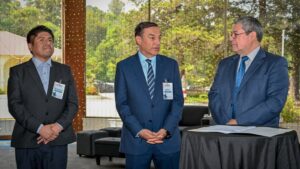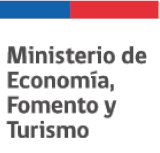
 On October 16, 2025, the President of the IMARPE Board of Directors, Rear Admiral Jorge Paz Acosta, and the Director of IFOP, Gonzalo Pereira Puchy, signed in Viña del Mar, Chile, the Addendum to the SCIENTIFIC AND TECHNICAL COLLABORATION AGREEMENT BETWEEN THE FISHERIES DEVELOPMENT INSTITUTE OF CHILE (IFOP) AND THE MARINE INSTITUTE OF PERU (IMARPE), through which the exchange of scientific personnel between the two institutes is promoted; it encourages the performance of collaborative research on fishery resources of common interest, present in the upwelling ecosystems of the Southeast Pacific; as well as the study of the environmental conditions in which the resources are located and the fisheries are developed, with special emphasis on climate variability and the ecosystem approach. This agreement also facilitates the exchange of biological and fishery data on hydrobiological resources of common interest.
On October 16, 2025, the President of the IMARPE Board of Directors, Rear Admiral Jorge Paz Acosta, and the Director of IFOP, Gonzalo Pereira Puchy, signed in Viña del Mar, Chile, the Addendum to the SCIENTIFIC AND TECHNICAL COLLABORATION AGREEMENT BETWEEN THE FISHERIES DEVELOPMENT INSTITUTE OF CHILE (IFOP) AND THE MARINE INSTITUTE OF PERU (IMARPE), through which the exchange of scientific personnel between the two institutes is promoted; it encourages the performance of collaborative research on fishery resources of common interest, present in the upwelling ecosystems of the Southeast Pacific; as well as the study of the environmental conditions in which the resources are located and the fisheries are developed, with special emphasis on climate variability and the ecosystem approach. This agreement also facilitates the exchange of biological and fishery data on hydrobiological resources of common interest.
This agreement was promoted by the GEF/UNDP/SUBPESCA/Vice Ministry of Fisheries and Aquaculture “Humboldt II” project, a Chile–Peru binational initiative that identified the convenience of updating an old cooperation agreement as an important step to facilitate the achievement of the project’s objectives, particularly regarding the improvement of optimal exploitation of fishery resources.
This addendum to the original agreement, signed in 1992, reaffirms the extensive collaborative work experience of these institutions from the two most important fishing nations in South America, facilitating the work of researchers in matters of fishery resource assessment and the marine environment.
The signing of the document took place within the framework of the international conference “Integrated Management of Marine and Coastal Protected Areas in the Southeast Pacific,” organized by the CPPS and the Ministry of Foreign Affairs (MINREL) of Chile, held in Viña del Mar on October 16 and 17, and was attended by Soledad Tapia, National Director of the National Fisheries and Aquaculture Service (SERNAPESCA) of Chile; Manuel Ibarra, technical advisor of SERNAPESCA; specialists from the Humboldt II project; and researchers from IFOP and IMARPE.
Jorge Paz, while expressing his gratitude for the hospitality and facilities provided by the conference organizers to carry out the signing, stated that this agreement reaffirms and expands the collaborative work carried out by IMARPE and IFOP, and will allow the continuation of what has been achieved in recent times, especially since early 2024, which will be materialized for the benefit of the people of both countries.
For his part, Gonzalo Pereira, Director of IFOP, stated that IFOP and IMARPE are sister institutions, created at the same time, under the same concept, with similar developments, challenges, and problems. He also highlighted the efforts made by the Humboldt II project to facilitate the exchange of researchers between the two institutes, which in the last year has resulted in joint work, meetings, and scientific workshops, with the exchange of more than 25 professionals from each country, and that this agreement allows updating the commitments and refocusing the areas of interest.
Alejandro Gertosio, Binational Coordinator of the Humboldt II Project, in addition to thanking the willingness of IMARPE President Rear Admiral Jorge Paz and IFOP Director for making it possible to coordinate their agendas and achieve this signing, added that this agreement updates the exchange of information between IMARPE and IFOP necessary to carry out the work performed by the Binational Technical Groups (BTG) organized within the Humboldt II project, serving as a framework that facilitates cooperation, which is expected to be highly enriching for both institutes. The Humboldt II project, initiated at the end of 2022, is a binational initiative executed by SUBPESCA of Chile and the Vice Ministry of Fisheries and Aquaculture of Peru, with co-financing from the GEF and implementation by UNDP.
The document signed constitutes the third addendum to the original agreement, resulting from the need to expand it with the purpose of strengthening the population assessment of shared fishery resources and promoting research with an ecosystem approach on these resources, in accordance with the research topics that the parties agreed to develop in the original agreement.
Press related links:




